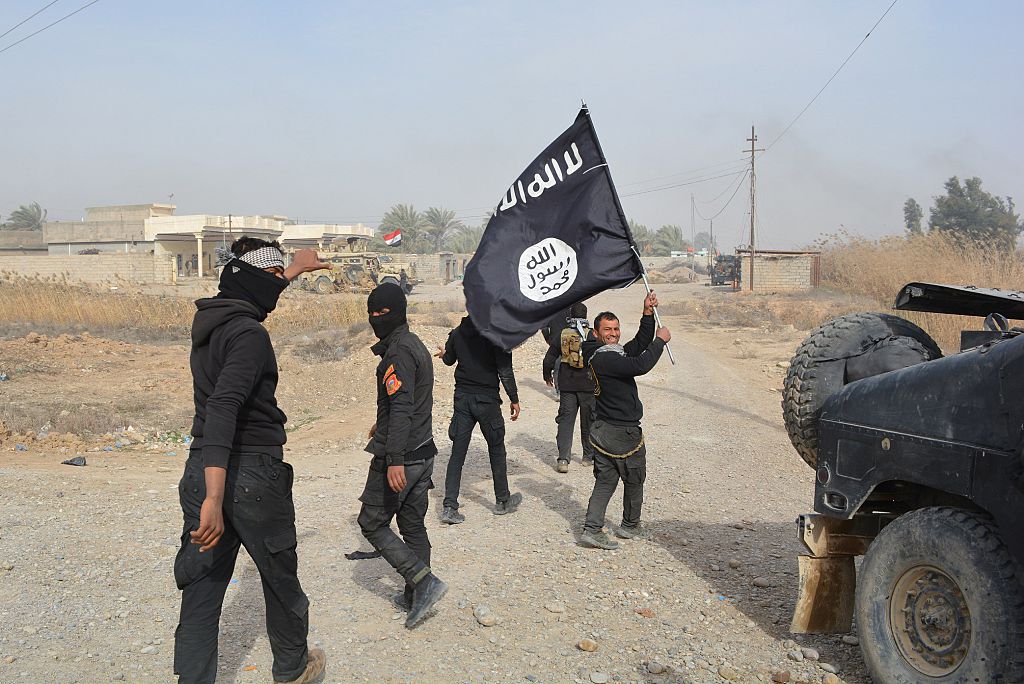ISIS wants the U.S. to send ground troops to fulfill its apocalyptic prophecy, experts say


The central dilemma of the fight against the Islamic State is probably that it can't be won from the air alone, but sending in Western ground forces is almost certainly a losing proposition. One reason is that a ground war against the mighty U.S. military would be a recruitment bonanza for ISIS, at a moment when its volunteer numbers appear to be waning. Another, explains Rukmini Callimachi at The New York Times, is that ISIS "bases its ideology on prophetic texts stating that Islam will be victorious after an apocalyptic battle to be set off once Western armies come to the region."
The stage will be set for the end times, according to ISIS propaganda, when the "Romans" — the U.S. and its allies — enter Dabiq and al-Amaq, two towns that still exist in northern Syria, Callimachi explains, noting that ISIS isn't very subtle on this point: Its monthly magazine is called Dabiq, its new semiofficial news agency is named Amaq, and the group executed American hostage Peter Kassig in Dabiq, saying ISIS is "eagerly waiting for the remainder of your armies to arrive."
“I have said it repeatedly: Because of these prophecies, going in on the ground would be the worst trap to fall into," Jean-Pierre Filiu, a professor of Middle East Studies at France's Sciences Po, tells The New York Times. "They want troops on the ground. Because they have already envisioned it.... It's a very powerful and emotional narrative. It gives the potential recruit and the actual fighters the feeling that not only are they part of the elite, they are also part of the final battle." Read more about ISIS's apocalyptic death wish at The New York Times.
The Week
Escape your echo chamber. Get the facts behind the news, plus analysis from multiple perspectives.

Sign up for The Week's Free Newsletters
From our morning news briefing to a weekly Good News Newsletter, get the best of The Week delivered directly to your inbox.
From our morning news briefing to a weekly Good News Newsletter, get the best of The Week delivered directly to your inbox.
A free daily email with the biggest news stories of the day – and the best features from TheWeek.com
Peter has worked as a news and culture writer and editor at The Week since the site's launch in 2008. He covers politics, world affairs, religion and cultural currents. His journalism career began as a copy editor at a financial newswire and has included editorial positions at The New York Times Magazine, Facts on File, and Oregon State University.
-
 Russia’s ‘weird’ campaign to boost its birth rate
Russia’s ‘weird’ campaign to boost its birth rateUnder the Radar Demographic crisis spurs lawmakers to take increasingly desperate measures
-
 Could smaller cars bring down vehicle prices?
Could smaller cars bring down vehicle prices?Today’s Big Question Trump seems to think so, but experts aren’t so sure
-
 2025’s most notable new albums
2025’s most notable new albumsThe Week Recommends These were some of the finest releases of the past year
-
 British warship repels 'largest Houthi attack to date' in the Red Sea
British warship repels 'largest Houthi attack to date' in the Red SeaSpeed read Western allies warn of military response to Iranian-backed Yemeni rebels if attacks on ships continue
-
 Houthi rebels claim Red Sea ship attacks
Houthi rebels claim Red Sea ship attacksspeed read Iran-backed Yemeni group vows to escalate aggression towards Israel-linked vessels in revenge for Gaza war
-
 Israel plans next phase of Gaza war as first hostages released
Israel plans next phase of Gaza war as first hostages releasedSpeed read After four-day ceasefire 'we will not stop' until destruction of Hamas, says Israel
-
 Mob storms Russian airport 'looking for Jews'
Mob storms Russian airport 'looking for Jews'Speed Read Plane from Israel surrounded by rioters chanting antisemitic slogans after landing in Russia's Dagestan region
-
 Tuberville's military promotions block is upending lives, combat readiness, 3 military branch chiefs say
Tuberville's military promotions block is upending lives, combat readiness, 3 military branch chiefs saySpeed Read
-
 Ukraine's counteroffensive is making incremental gains. Does it matter in the broader war?
Ukraine's counteroffensive is making incremental gains. Does it matter in the broader war?Speed Read
-
 US commissions first-ever Navy ship in a foreign port
US commissions first-ever Navy ship in a foreign portSpeed Read
-
 British spy chief, Wagner video suggest Prigozhin is alive and freely 'floating around'
British spy chief, Wagner video suggest Prigozhin is alive and freely 'floating around'Speed Read
